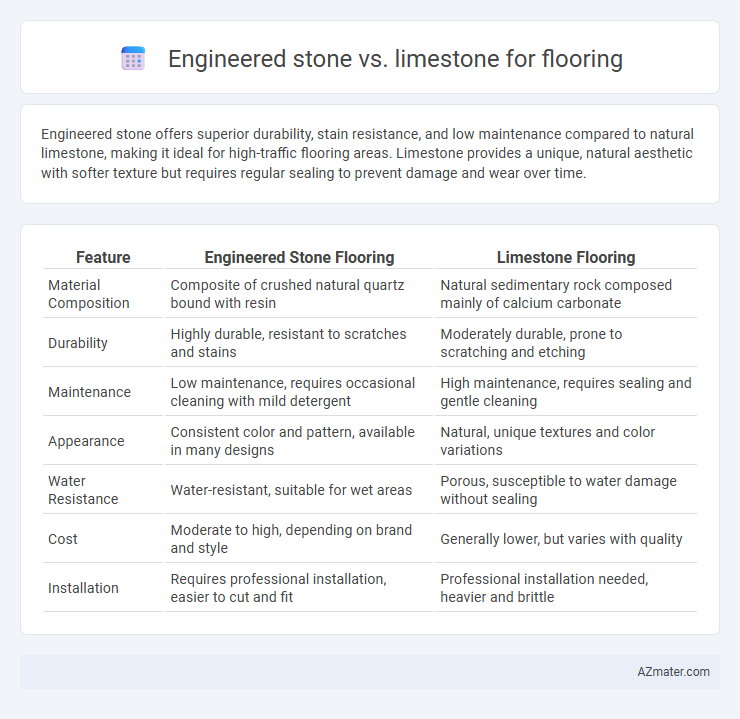Engineered stone offers superior durability, stain resistance, and low maintenance compared to natural limestone, making it ideal for high-traffic flooring areas. Limestone provides a unique, natural aesthetic with softer texture but requires regular sealing to prevent damage and wear over time.
Table of Comparison
| Feature | Engineered Stone Flooring | Limestone Flooring |
|---|---|---|
| Material Composition | Composite of crushed natural quartz bound with resin | Natural sedimentary rock composed mainly of calcium carbonate |
| Durability | Highly durable, resistant to scratches and stains | Moderately durable, prone to scratching and etching |
| Maintenance | Low maintenance, requires occasional cleaning with mild detergent | High maintenance, requires sealing and gentle cleaning |
| Appearance | Consistent color and pattern, available in many designs | Natural, unique textures and color variations |
| Water Resistance | Water-resistant, suitable for wet areas | Porous, susceptible to water damage without sealing |
| Cost | Moderate to high, depending on brand and style | Generally lower, but varies with quality |
| Installation | Requires professional installation, easier to cut and fit | Professional installation needed, heavier and brittle |
Introduction to Engineered Stone and Limestone Flooring
Engineered stone flooring consists of crushed natural stones mixed with resin and pigments, offering high durability, low porosity, and resistance to stains and scratches, making it ideal for high-traffic areas. Limestone flooring is a sedimentary rock with a softer texture and natural veining that provides a warm, elegant look but requires regular sealing due to its porous nature and susceptibility to acid damage. Both materials offer distinct aesthetic and functional benefits, with engineered stone excelling in maintenance and durability, while limestone emphasizes natural beauty and classic appeal.
Composition and Manufacturing Process
Engineered stone flooring is composed primarily of crushed quartz mixed with resin and pigments, providing high durability and consistency through a controlled manufacturing process involving compression and curing. Limestone flooring is a natural sedimentary rock formed from calcite and fossilized marine organisms, extracted directly from quarries and cut into slabs with minimal processing. The engineered stone's manufacturing offers enhanced strength and uniformity, while limestone's natural formation results in unique textures but requires sealing to improve resistance.
Appearance and Design Versatility
Engineered stone offers a consistent and customizable appearance with a wide range of colors and patterns, mimicking natural stones while providing enhanced durability and low maintenance. Limestone features unique, natural textures and earthy tones that bring timeless elegance and warmth but may show wear more easily. The design versatility of engineered stone suits modern, sleek aesthetics and complex layouts, whereas limestone is favored for classic, rustic, and traditional flooring styles.
Durability and Strength Comparison
Engineered stone offers superior durability and strength compared to limestone, featuring a composite of crushed quartz and resin that enhances resistance to scratches, stains, and impact. Limestone, a natural sedimentary rock, is softer and more prone to wear, chipping, and acid damage, requiring more maintenance to preserve its appearance. For high-traffic flooring applications, engineered stone provides long-lasting performance and minimal upkeep, while limestone demands careful handling and periodic sealing.
Maintenance and Cleaning Requirements
Engineered stone flooring offers superior resistance to stains and scratches, requiring minimal maintenance compared to limestone, which is porous and prone to absorbing spills, needing frequent sealing and careful cleaning to prevent damage. Cleaning engineered stone typically involves simple wiping with mild detergents, while limestone demands specialized pH-neutral cleaners to maintain its surface integrity. The durability of engineered stone reduces long-term maintenance costs, whereas maintaining limestone floors often incurs higher expenses due to regular sealing and careful handling.
Water and Stain Resistance
Engineered stone offers superior water and stain resistance compared to limestone, thanks to its non-porous composition and resin binders that prevent liquid absorption and staining. Limestone, a natural sedimentary rock, is inherently porous and requires regular sealing to protect against water damage and stains, making maintenance more intensive. The enhanced durability of engineered stone makes it a more practical choice for high-moisture areas prone to spills and wear.
Cost and Installation Factors
Engineered stone offers higher durability and requires less maintenance compared to limestone, making it a cost-effective option over time despite a higher initial price. Limestone is generally less expensive upfront but may incur additional costs for sealing and repairs due to its porous nature. Installation of engineered stone is typically more complex and requires professional expertise, whereas limestone installation is simpler but demands careful handling to avoid damage.
Eco-Friendliness and Sustainability
Engineered stone flooring offers higher eco-friendliness compared to limestone as it utilizes recycled materials and reduces the demand for natural quarrying. Limestone extraction often involves significant environmental disruption and depletion of finite natural resources. Choosing engineered stone supports sustainable construction practices by minimizing habitat destruction and promoting resource efficiency.
Performance in High-Traffic Areas
Engineered stone offers superior durability and resistance to scratches, stains, and impacts compared to limestone, making it ideal for high-traffic areas. Limestone, while aesthetically pleasing with its natural texture, is softer and more prone to wear and etching under heavy use. Engineered stone's non-porous surface also reduces maintenance requirements and enhances longevity in commercial or busy residential settings.
Pros and Cons: Engineered Stone vs Limestone
Engineered stone flooring offers superior durability, stain resistance, and low maintenance compared to limestone, which is softer and more porous, making it prone to scratching and staining. Limestone provides a natural, warm aesthetic with unique textures and color variations that enhance classic or rustic interiors but requires regular sealing and careful upkeep to preserve its appearance. While engineered stone tends to be more expensive upfront, its long-term performance and resistance to wear make it cost-effective, whereas limestone's susceptibility to damage can increase maintenance costs over time.

Infographic: Engineered stone vs Limestone for Flooring
 azmater.com
azmater.com